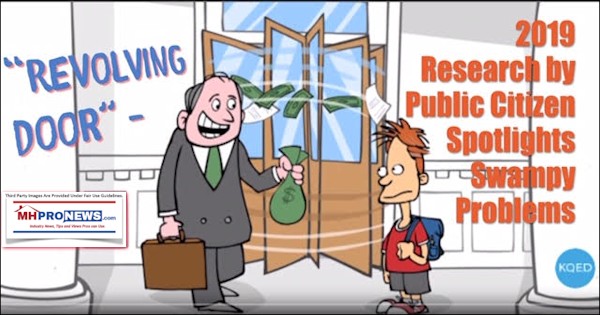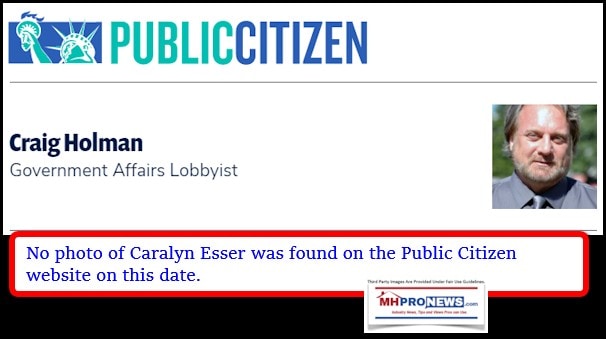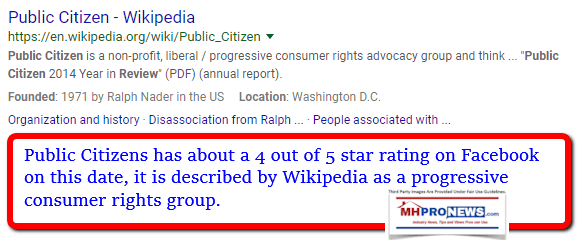
There are several organizations across the left-right political spectrum that have done research similar to what the nonprofit group Public Citizen has produced. Citing this research should not be construed as an endorsement of the organization’s other positions, or even of their proposals with respect to this specific issue of the ‘revolving door.’ That disclaimer noted, co-authors Craig Holman, Ph.D, and Caralyn Esser have done useful research that provides a snapshot of what the revolving door is, how it works, and how it is handled differently by the federal government and various states.
The researcher/writers also explain why and how the revolving door impacts businesses and consumers. That’s why its being reviewed here on MHProNews, because it has implications for our industry on several levels.
To tee up the topic for those unfamiliar with the issues is this video by KQED. While the video uses examples from California, and laws vary from state to state or at the federal level, the concepts behind the video are often applicable, as Holman’s and Esser’s research shown further below reveals.
A more detailed look at this same vexing issue of the revolving door is found in the PBS video below. The same disclaimers noted above apply.
With those backdrops, let’s look at some of the research by Holman and Esser into this topic. As you are reading, ponder how this practice can – and arguably has – impacted manufactured housing.
“Public officials are charged with creating policies or fulfilling duties that serve the public interest of the American people. Increasingly, however, these public officials are leaving government service to work for private interests, as well as their own, as lobbyists or strategic consultants on behalf of lobbying campaigns for special interests. This is known as the “revolving door” in which government officials swing back and forth between public service and lucrative private-sector employment. The revolving door muddies the mandate of public officials, overlapping it with special and personal interests,” said Holman and Esser in “Slowing the Federal Revolving Door,” which had the subtitle “Reforms to Stop Lobbying Activity by Former Public Officials and States that Lead the Way.”
“While the revolving door swings both ways between government and special interests in the private sector – and it is critically important to address the issue of the “reverse revolving door” of lobbyists and special interests moving into government – the focus of this research is the Government-to-Lobbyist Revolving Door: This is the movement of former lawmakers and executive-branch officials to jobs as well-paid advocates, often on behalf of the same special interests that previously had business pending before them, and who are able to use inside connections from their former place of employment to advance the interests of their clients,” according to the researchers Public Citizen report.

The government-to-lobbyist revolving door threatens the integrity of government in at least three ways:
· Public officials may be influenced in official actions by the implicit or explicit promise of a lucrative job in the private sector with an entity seeking a government contract or to shape public policy.
· Public officials-turned-lobbyists will have access to lawmakers that is not available to others, access that can be sold to the highest bidder among industries seeking to lobby.
· The special access and inside connections to sitting government officials by former officials-turned-lobbyists comes at a hefty price tag, providing wealthy special interests that can afford hiring such revolvers with a powerful means to influence government unavailable to the rest of the public.
As business interests have become more intertwined with government regulations and other official actions, the revolving door has become a bigger problem and so pervasive that it seriously threatens the integrity of the legislative process. One academic study of members of Congress between 1976 and 2012 found a dramatic growth in the revolving door over just the last few decades. Relatively few members became lobbyists in the 1970s (fewer than 10 percent for both the House and Senate). The trend accelerated dramatically in the 1990s and 2000s, with 50 percent of former House members and 60 percent of former Senators becoming registered lobbyists in 2012.[1] A more recent study by Public Citizen found that in 2019 nearly two-thirds of former members of Congress have moved into jobs working for lobby firms, consulting firms, trade groups or business groups that seek to influence federal governmental policies.[2]…
Hollman and Esser said that “There are a few incentives that have caused this drastic increase, all of which are connected to money. Special interest groups are willing to make the investment in well-connected lobbyists because the regulatory and legislative stakes are so high.”
Their entire 13 page report for Public Citizen is available as a download linked here, which includes state level findings.
There are several ways that this problematic phenomenon plays out in manufactured housing, as has been reviewed in a prior report, shown linked in the related reports, below. But the significance of this to the industry, public, investors, and advocates will be made ever clearer in the days ahead. So we will likely refer back to this topic, as it matters to you and MHVille.

That’s the initial episode today of “News Through the Lens of Manufactured Homes, and Factory-Built Housing” © where “We Provide, You Decide.” © ## (News, analysis, and commentary.)

Soheyla is a managing member of LifeStyle Factory Homes, LLC, the parent company to MHProNews, and MHLivingNews.com. Connect with us on LinkedIn here and here.
Related Reports:
Click the image/text box below to access relevant, related information.

























